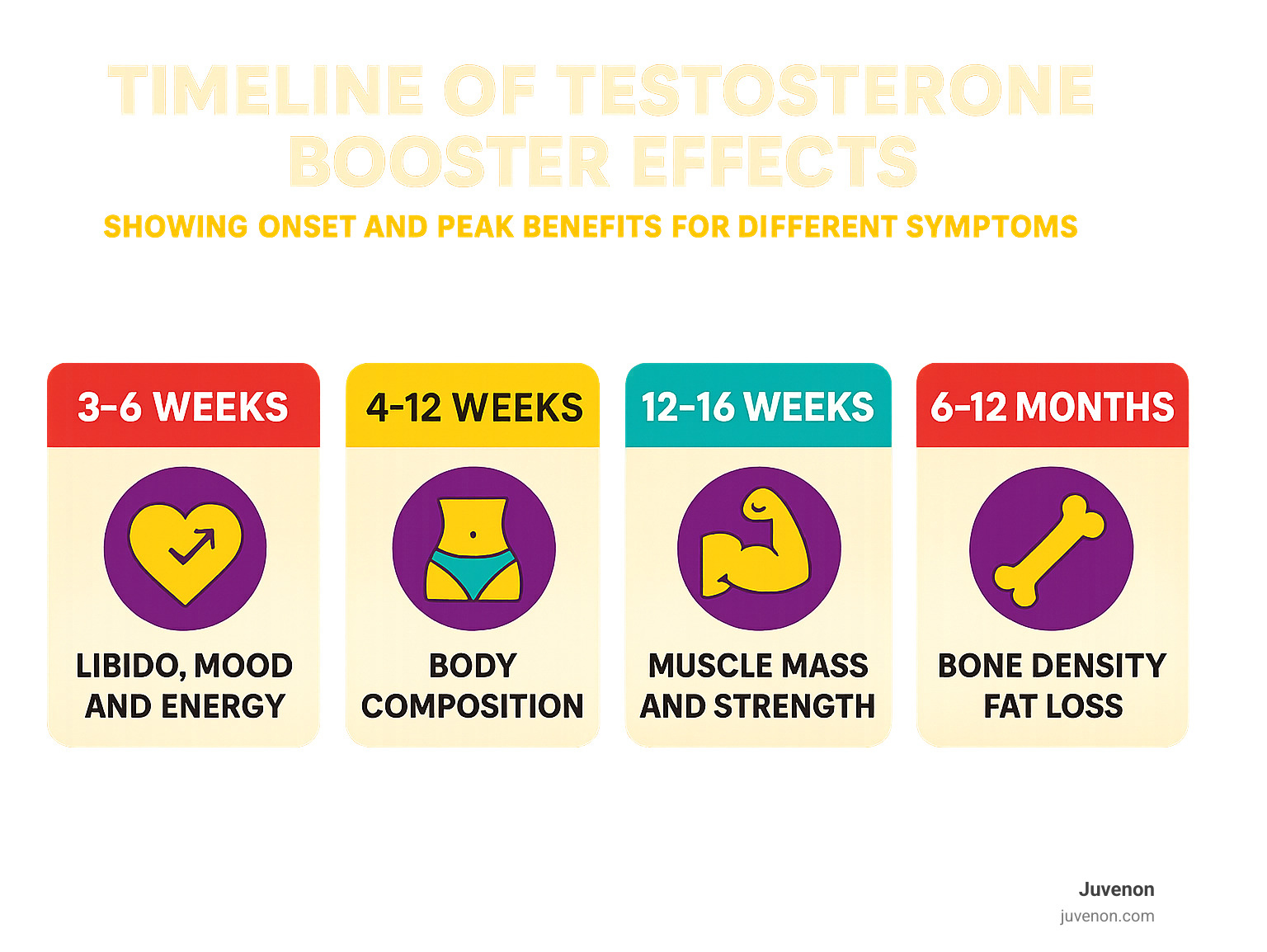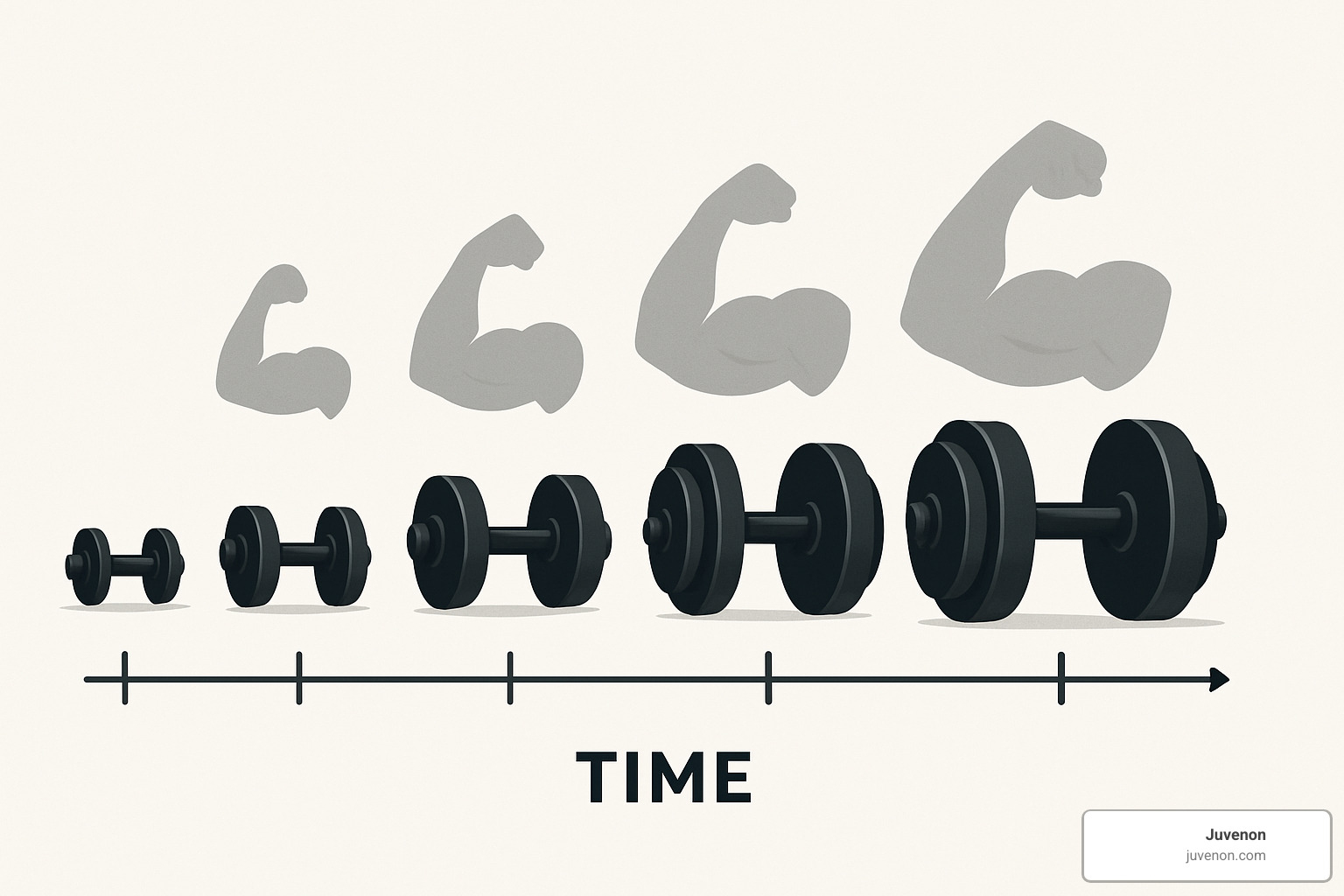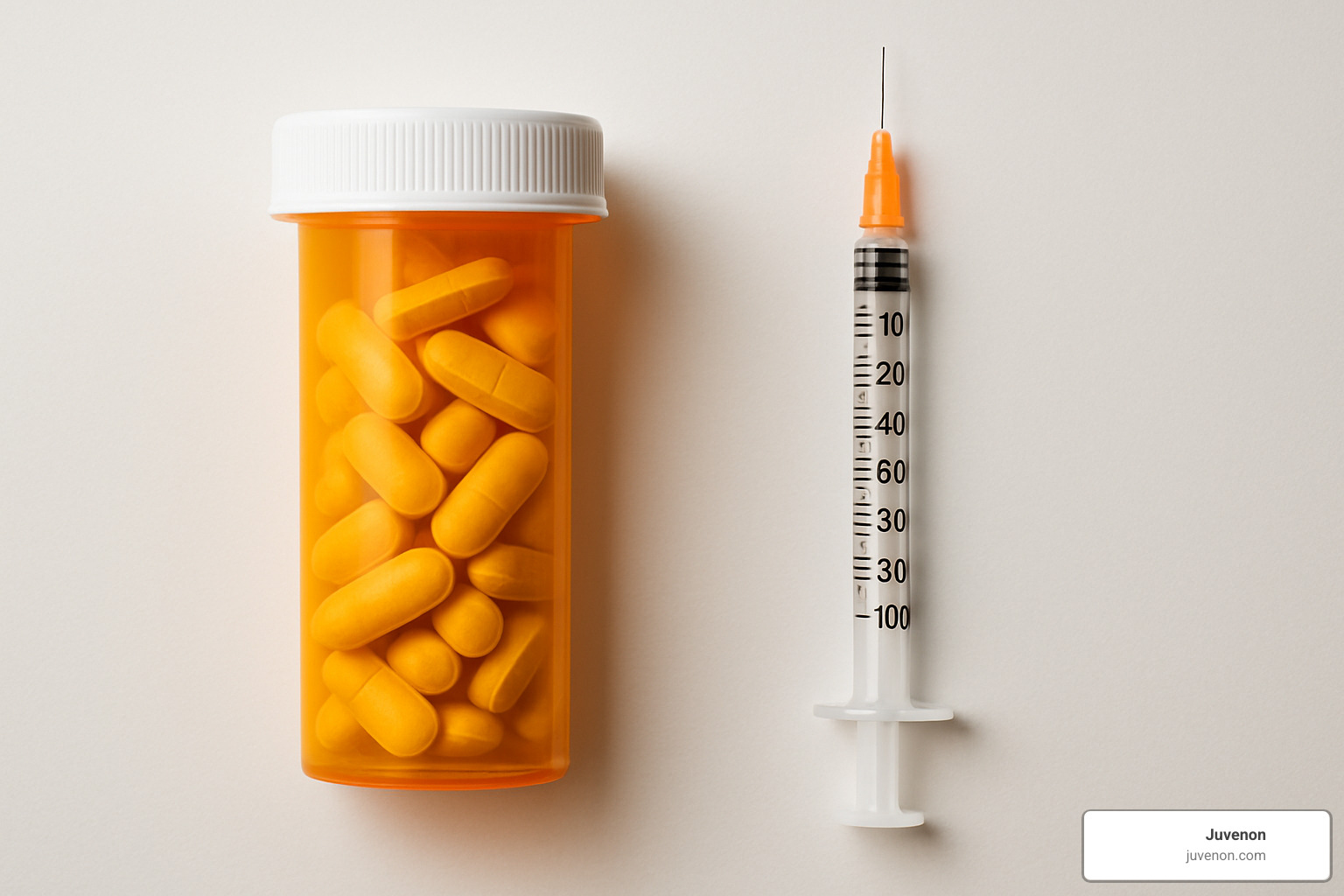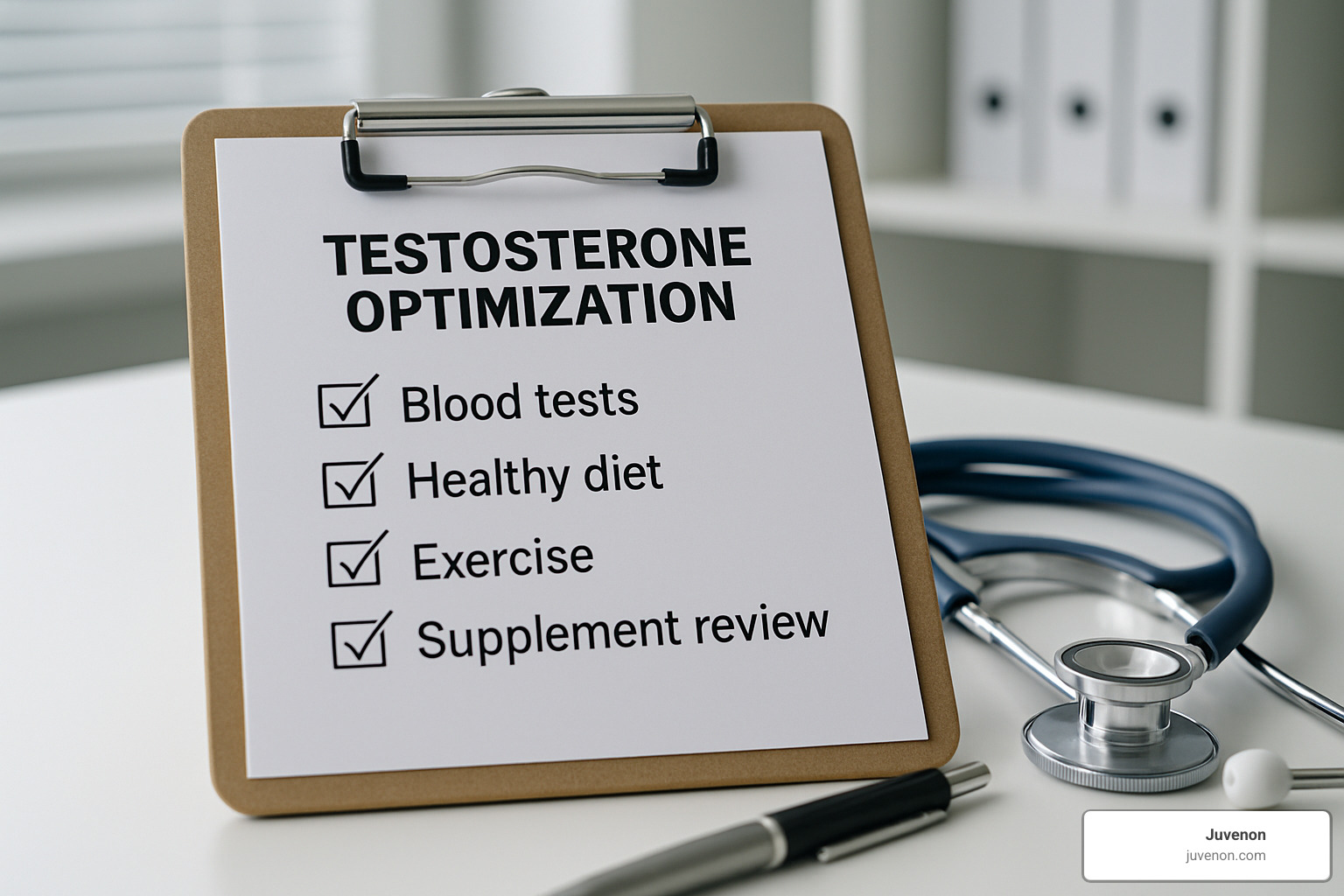Testosterone Booster Timeline: What to Expect and When
How long does it take for testosterone booster to work depends on the specific symptom you're looking to improve and the type of booster you're using. Here's a quick breakdown of what to expect:
| Timeline | What to Expect |
|---|---|
| 3-6 weeks | Initial improvements in libido, mood, and energy |
| 4-12 weeks | Changes in body composition begin |
| 12-16 weeks | Noticeable muscle mass and strength gains |
| 6-12 months | Full effects stabilize (muscle, fat loss, bone density) |
| Up to 3 years | Continued bone density improvements |
If you're considering taking a testosterone booster, you're likely experiencing some of the frustrating symptoms of low testosterone - reduced energy, declining muscle mass, or decreased libido. These symptoms can significantly impact your quality of life, but understanding realistic timelines for improvement can help set proper expectations.
Natural testosterone boosters typically take longer to show results compared to prescription testosterone replacement therapy (TRT). With natural supplements, your body needs time to respond to the ingredients that stimulate your own testosterone production, rather than directly adding the hormone to your system.
I'm Michelle M. Henson, and as Head of Copywriting for Juvenon, I've spent years researching and explaining how long does it take for testosterone booster to work through our educational content about hormone optimization for healthy aging.

How Long Does It Take for Testosterone Booster to Work?
Waiting for results after starting a testosterone booster can feel like watching paint dry. I get it—you want to know when those benefits will kick in! The reality is that testosterone boosters work gradually, with different effects appearing on their own timeline.
Most people begin to notice the first subtle changes within 3-6 weeks of consistent use. But don't expect overnight miracles. The complete spectrum of benefits unfolds over months, with some effects continuing to improve for up to a year or longer.
A fascinating systematic review published in the European Journal of Endocrinology by Dr. Corona and colleagues mapped out how testosterone optimization affects different body systems over time. While their research focused primarily on prescription testosterone, it gives us valuable insights into the general timeline of hormone optimization:
- Fast effects (days to weeks): Improvements in insulin sensitivity and mood
- Medium-term effects (weeks to months): Improved sexual desire, increased energy, and fat reduction
- Slower effects (months to years): Gains in muscle mass, strength, and bone density
At Juvenon, we've observed similar patterns with our natural testosterone support formulas, though the timeline is typically a bit more gradual compared to prescription options.
Think of testosterone boosters as gardeners, not magicians. They work by nurturing your body's natural production mechanisms rather than directly supplying testosterone. You're supporting a biological process, not flipping a switch—and that takes patience.
How long does it take for testosterone booster to work for libido?
If you're hoping for improvements in the bedroom, I've got good news. Improved libido is typically one of the first noticeable benefits of increasing testosterone levels. According to clinical research, most men begin to experience improvements in sexual interest after about 3-4 weeks of consistent testosterone optimization.
These libido-enhancing effects usually plateau around the 6-week mark. You'll likely continue experiencing benefits beyond this point, but the rate of improvement typically stabilizes. This relatively quick response is precisely why many men report sexual desire as the first "Aha!" moment when taking testosterone boosters.

Why does libido respond so quickly? Testosterone affects certain brain pathways almost immediately through what scientists call "non-genomic actions." These pathways can influence mood and desire before other physical changes become apparent.
It's worth noting that while sexual interest may improve within weeks, changes in erectile function might take longer—up to 6 months in some cases. This is because getting and maintaining an erection depends not just on hormone levels but also on vascular health, which takes more time to improve.
Many Juvenon customers tell us that this early boost in libido serves as welcome confirmation that their testosterone support regimen is working, even before other benefits become noticeable.
How long does it take for testosterone booster to work for muscle and mood?
When it comes to building muscle and lifting your spirits, testosterone boosters operate on different schedules:
For mood improvements, you might start feeling more positive, confident, and energetic within 3-6 weeks of starting a testosterone booster. That initial mental lift can be quite noticeable, but research shows that the full mood-enhancing effects may not reach their peak until 18-30 weeks (4.5-7.5 months) into treatment.
For muscle mass and strength gains, you'll need a bit more patience:

Initial changes typically become detectable between 12-16 weeks (3-4 months) after starting. These improvements continue to build and stabilize over 6-12 months. If you're hitting the gym regularly, you'll likely see more dramatic results, as consistent training significantly amplifies testosterone's muscle-building effects.
Why does building muscle take so long? Because it's a complex biological process. Testosterone increases protein synthesis and decreases protein breakdown, but the visible accumulation of new muscle tissue takes time—especially when using natural boosters rather than direct hormone replacement.
Your results will vary based on several factors: your age, starting testosterone levels, diet, exercise habits, and genetic makeup all influence how quickly you'll see muscle development. A 35-year-old with slightly low testosterone might see faster results than a 65-year-old with severely depleted levels.
We encourage our Juvenon customers to track their progress with photos and measurements taken every 4-6 weeks. These gradual changes can be tough to notice day-to-day, but comparing photos from a month or two ago often reveals impressive improvements you might have missed!
For more scientific details on testosterone's effects on the body over time, you can review research from the National Center for Biotechnology Information.
Booster Types & Symptom Timelines
When it comes to testosterone boosters, not all options are created equal. The type you choose significantly affects how quickly you'll see results – kind of like the difference between taking the scenic route versus the highway to the same destination.
Natural supplements vs. prescription therapy
Natural testosterone supplements work like gentle gardeners – they nurture your body's own ability to produce testosterone rather than taking over the job completely. Popular natural ingredients include fenugreek and ashwagandha, which typically show results after 8-12 weeks of consistent use.
While natural options like zinc and D-Aspartic Acid can help men with deficiencies, other popular ingredients like Tribulus terrestris have gained popularity despite having limited scientific evidence backing their effectiveness for testosterone production.

On the other side of the spectrum, prescription testosterone replacement therapy (TRT) works more directly. Rather than encouraging your body to produce more testosterone, TRT simply adds the hormone to your system. This approach comes in several forms, each with its own timeline:
Injections deliver results fastest, often within 1-2 weeks, because they bypass the digestive system and deliver testosterone directly into the bloodstream. Gels and patches work more gradually, typically showing effects in 2-4 weeks as the hormone absorbs through your skin. Pellets implanted under the skin release testosterone slowly over 3-6 months, while oral capsules are less commonly prescribed due to potential liver concerns.
At Juvenon, we believe in working with your body's natural processes rather than replacing them. While our natural formulations may take slightly longer to show results than prescription options, they support your body's long-term hormonal health without creating dependency.
Detailed symptom timeline by method
Your body responds to increased testosterone in a specific order, almost like a predictable sequence of dominos falling. Sexual function typically improves first, followed by energy levels, then physical changes, and finally bone density.
For sexual function, natural boosters typically improve libido within 3-6 weeks, while improvements in erectile function take 6-12 weeks. If you're using TRT injections, you might notice libido improvements sooner – around 2-3 weeks – with erectile function following at 4-8 weeks. Gel and patch users usually experience libido improvements in 3-4 weeks and erectile function benefits in 6-10 weeks.
When it comes to energy and mood, natural boosters often provide an initial energy boost in 2-4 weeks, but the full mood-enhancing effects may take 6-12 weeks to develop. TRT injections can boost energy in just 1-3 weeks with mood improvements following at 3-6 weeks. Gel and patch users typically notice energy improvements in 2-4 weeks and mood improvement in 4-8 weeks.
Body composition changes require more patience regardless of the method. With natural boosters, you might notice initial changes around 8-12 weeks, with more significant improvements appearing after 4-6 months. TRT injection users typically see fat reduction beginning around 4-6 weeks, with muscle gains becoming noticeable at 8-12 weeks. For gel and patch users, fat reduction usually starts at 6-8 weeks, with muscle gains appearing around 10-14 weeks.
Bone density improvements follow the slowest timeline of all, with initial changes detectable at around 6 months regardless of which method you choose. These improvements continue gradually for up to 3 years, showing that some of testosterone's most important health benefits are also its most patient ones.
This variety in timelines explains why experiences with testosterone boosters can differ so dramatically from person to person. Your results depend not just on the method you choose, but also on your individual health profile and which specific symptoms you're most focused on improving. Understanding these timelines can help you maintain realistic expectations and the patience needed to see your desired results.
Factors That Change How Fast You See Results
When it comes to testosterone boosters, your results timeline isn't set in stone. I've seen how dramatically different the experience can be from person to person. Let's talk about what might speed up—or slow down—your journey to feeling better.
Your age plays a significant role in how quickly you'll respond. Men under 40 typically see faster results because their bodies are generally more responsive to hormonal changes. Their endocrine systems are usually more adaptable, and their cells tend to be more sensitive to testosterone's effects.
Starting baseline testosterone levels matter tremendously. If you're beginning with extremely low T, you'll likely notice more dramatic improvements more quickly than someone with just slightly low levels. It's like being very thirsty versus just a little thirsty—the relief is more noticeable when the need is greater.
Your overall health can accelerate or put the brakes on your results. Conditions like diabetes, obesity, or thyroid problems often slow your body's response to testosterone boosters. These conditions create a less hospitable environment for hormonal optimization.
Being consistent with your supplements is non-negotiable. Missing doses or taking your booster sporadically is like trying to fill a leaky bucket—you'll never reach the level you're aiming for. Your body needs steady support to adjust its hormone production patterns.
We all have different genetic factors at play too. Some men simply respond better to certain ingredients based on variations in their androgen receptor sensitivity. Think of it like how some people get a buzz from one cup of coffee while others need three to feel anything.
How efficiently your body absorbs the active ingredients also matters. Your personal digestive system and metabolism can significantly impact how well your body uses the supplement's components.
At Juvenon, we formulate our testosterone support products with these individual differences in mind, using ingredients that work effectively across a wide range of biological variations.
Diet, exercise, and sleep accelerators
Want to turbocharge your results? The right lifestyle choices can dramatically speed up how quickly your testosterone booster works.
Your nutrition choices make a huge difference. Eating enough protein (about 1.6-2.2g per kg of your body weight daily) gives your body the building blocks it needs for hormone production. Healthy fats, especially monounsaturated and omega-3s, are crucial for hormone synthesis. Vitamin D and zinc are like fuel for your testosterone engine—many men are deficient in both without realizing it. And yes, you should limit alcohol, which can suppress testosterone production even when you're taking boosters.

The right exercise routine can potentially double your results. Heavy resistance training 3-4 times weekly, focusing on compound movements like squats and deadlifts, sends powerful signals to your body to produce more testosterone. Adding high-intensity interval training (HIIT) 1-2 times weekly can further boost your hormonal response. Just be careful not to overdo cardio, which can raise cortisol and counteract your testosterone goals. Recovery between workouts is when the magic happens—your body needs that downtime to optimize hormone levels.
Never underestimate the power of quality sleep. Those 7-9 hours of shut-eye are when your body does most of its testosterone production. Establishing consistent sleep patterns, limiting blue light exposure before bed, and managing stress through techniques like meditation can dramatically improve your results. I've seen men break through plateaus simply by improving their sleep quality for a few weeks.
Research confirms how powerful these lifestyle factors can be. A study in the Journal of Clinical Endocrinology & Metabolism found that weight loss alone could increase testosterone by 50% in overweight men—imagine combining that effect with a quality testosterone booster!
When results slow down or stop
Sometimes you might hit a frustrating plateau or fail to see the results you expected. Let's talk about why this happens and what to do about it.
Certain medications can quietly sabotage your progress. Opioid pain medications, some antidepressants, statins, corticosteroids, and certain blood pressure medications can all interfere with testosterone production or block the effectiveness of boosters. If you're taking any of these, talk with your doctor about potential alternatives or adjustments.
Lifestyle choices can also cancel out the benefits of your testosterone booster. Drinking more than two alcoholic beverages daily, smoking (both tobacco and marijuana), chronic sleep deprivation, extreme dieting, and overtraining without recovery can all counteract your supplement's effects. These factors create a hormonal environment that works against your testosterone goals.
Sometimes underlying health conditions are the culprit. Undiagnosed thyroid disorders, pituitary gland problems, chronic inflammation, insulin resistance, or liver and kidney dysfunction can all prevent optimal testosterone production. These conditions may need to be addressed directly before you'll see full benefits from your booster.
The quality of your supplement matters tremendously. Underdosed ingredients, poor bioavailability, inconsistent manufacturing standards, or expired products can all lead to disappointing results. At Juvenon, we prioritize bioavailable forms of ingredients at clinically effective dosages, but it's always worth checking that what you're taking meets quality standards.
If you've been consistently taking a testosterone booster for 3 months without noticing improvements, it's time to investigate these potential roadblocks with a healthcare professional. Even the best supplement can't overcome certain underlying issues without additional support.
For more information about lifestyle factors that can boost your results, check out our article on how testosterone boosters work to improve performance.
Safety, Monitoring, and When to Adjust Course
Starting a testosterone booster is exciting, but it's also important to be smart about how you use it. Think of it like getting a new car – you want to enjoy the ride, but you also need to check the oil and tire pressure regularly to keep things running smoothly.
When using testosterone boosters, your body will give you signals about how it's responding. Some changes are normal, while others might need attention. Here's what to keep an eye on:
Most people experience mild adjustments as their body responds to improved testosterone levels. You might notice slightly oilier skin, occasional acne, or some initial sleep changes. These typically balance out as your body adapts to your new hormone profile.
More significant side effects are rare with natural boosters but more common with prescription TRT. These include erythrocytosis (where your body makes too many red blood cells), changes to prostate health, shifts in cholesterol levels, and potential blood pressure increases. This is why regular check-ins with your doctor are so important.
Your monitoring roadmap should include baseline bloodwork before you start, a follow-up test at the 3-month mark, and then regular testing every 6-12 months. If you have existing health conditions, your doctor might recommend more frequent checks.
Natural testosterone support formulas like those we offer at Juvenon typically carry fewer risks than prescription options, but we still strongly encourage working with healthcare providers. Your wellness journey deserves professional guidance, even when using natural approaches.
What to do if you don't notice results in time
Sometimes, despite following all the right steps, you might not see the improvements you expected within the typical timeline. Don't worry – there are several paths forward:
First, verify with testing rather than relying solely on how you feel. Blood tests can show hormonal improvements that you might not physically notice yet. Sometimes your numbers improve before your symptoms do.
Next, take an honest look at your lifestyle habits. Even the best testosterone booster can't overcome poor sleep, chronic stress, or a diet full of processed foods. These factors can silently counteract your supplement efforts.
Consider potential nutrient deficiencies that might be holding you back. Your body needs certain building blocks like vitamin D, zinc, and magnesium to produce testosterone effectively. Without these foundations, supplements may not work as well.

The quality of your supplement matters tremendously. Not all testosterone boosters are created equal – many use low-quality ingredients or ineffective dosages. At Juvenon, we formulate with bioavailable ingredients at clinically effective amounts, but this isn't true across the industry.
Sometimes you simply need to try a different formulation. We all have unique biochemistry, and what works wonderfully for one person might not be ideal for another. This is why we offer our 60-day money-back guarantee – we want you to find what truly works for your body.
Finally, don't hesitate to consult with a healthcare professional if you're not seeing results. There might be underlying conditions affecting your hormone production that need addressing before supplements can work effectively.
Optimizing your testosterone is more marathon than sprint. Some men need to explore different approaches before finding their perfect fit. At Juvenon, we're here to support you through that journey with science-backed formulations and honest guidance every step of the way.
Frequently Asked Questions about How Long Does It Take for Testosterone Booster to Work
How quickly will I feel more energy?
Energy improvement is often the first benefit that men notice when taking testosterone boosters. If you're feeling constantly drained, you'll be happy to know that most men report noticeable energy improvements within just 3-4 weeks of consistent use.
Think of this energy boost as coming in two waves. First, there's that initial uplift around the one-month mark, where you might find yourself needing less coffee in the afternoon or having the motivation to do more than just collapse on the couch after work. Then, as you continue supplementation for about three months or longer, you'll likely experience deeper, more sustained energy improvements that feel less like a temporary boost and more like a return to your natural vitality.
It's worth mentioning that your results may vary depending on what's causing your fatigue in the first place. If low testosterone is the primary culprit, you might experience more dramatic energy improvements compared to someone whose fatigue stems from poor sleep habits or other health conditions.
Are results permanent or do boosters need ongoing use?
I wish I could tell you that taking testosterone boosters for a few months would permanently solve all your hormone concerns, but that wouldn't be honest. The truth is that the benefits you experience from testosterone boosters typically require ongoing use to maintain – similar to how you need to keep taking a multivitamin to get its benefits.
When support for your body's testosterone production stops, the effects gradually fade: * Those quick-responding benefits like improved libido and energy typically begin declining within 1-2 weeks * Mood improvements might hang around a bit longer, gradually fading over 2-4 weeks * Physical changes like muscle mass take longer to disappear, usually diminishing over 1-3 months * Bone density gains may stick around the longest but will eventually return to baseline
This happens because natural testosterone boosters work by supporting your body's own production mechanisms rather than permanently rewiring them. Once you remove that support, your body typically reverts to its previous patterns.
Here at Juvenon, we formulate our products specifically for safe, long-term use. Many of our customers incorporate our testosterone support supplements into their ongoing health routines as part of their healthy aging strategy – similar to how you might take omega-3s or a daily multivitamin.
How long do effects last after stopping?
If you decide to stop taking your testosterone booster, the timeline for losing benefits varies considerably depending on which improvements you experienced.
The quick-responding benefits tend to fade first. Within about 1-4 weeks of stopping, you'll likely notice changes in your libido, energy levels, mood, and motivation. These are the same benefits that appeared first when you started, and unfortunately, they're usually the first to go when you stop.
The physical changes you worked hard for will stick around a bit longer. Your improvements in fat distribution, muscle definition, strength gains, and metabolic function typically fade over a 1-3 month period after discontinuation.
The most durable benefits are those that took longest to develop. If you experienced improvements in muscle mass (especially if you're continuing to exercise) and bone density, these might last anywhere from 3-12 months before fully returning to your pre-supplement baseline.
Several factors influence how quickly you lose benefits, including how long you used the booster, how significant your results were, your age, and your lifestyle habits after stopping. If you maintain excellent nutrition, regular exercise, and quality sleep after discontinuation, you'll likely hold onto your gains longer than someone who doesn't.
It's also important to remember that natural aging continues regardless of supplementation. Men typically lose about 1% of their natural testosterone production annually after age 30, which means that even maintaining your current levels requires some form of ongoing support as you age.
How long does it take for testosterone booster to work is just one part of the equation – understanding how long benefits last helps you make informed decisions about your long-term health strategy.
Conclusion
Understanding how long does it take for testosterone booster to work is crucial for anyone starting their hormone optimization journey. As we've seen throughout this guide, patience truly is key—your body needs time to respond to these natural supports.
The journey unfolds in stages, with different benefits appearing along a predictable timeline:
Your libido and sexual interest will likely be the first to respond, often within just 3-6 weeks of consistent use. Many of our Juvenon customers report this early win provides the motivation to continue their regimen.
Energy levels and mood improvements typically emerge in that same 3-6 week window, though these benefits continue to deepen over time. Many men tell us they didn't realize how foggy and fatigued they'd been until they experienced what optimal testosterone feels like.
Body composition changes require more patience. The visible muscle definition and fat redistribution you're hoping for typically takes 12-16 weeks to become noticeable, with results continuing to improve and stabilize over 6-12 months of consistent use.
Bone density improvements are the slowest to develop but also the most enduring. Initial changes begin around the 6-month mark, with improvements continuing for years with ongoing support.
At Juvenon, we believe in working with your body, not against it. Our testosterone support formulations are designed to nurture your natural production systems rather than override them. This approach delivers sustainable improvements without the risks associated with prescription hormone replacement.
Supplements work best as one part of a comprehensive strategy. The men who see the most dramatic improvements combine our formulations with proper nutrition, regular strength training, quality sleep, and effective stress management. This synergistic approach creates results far greater than any single intervention alone.
If you're just beginning your testosterone optimization journey, we recommend:
- Consider getting baseline testing if possible (though not strictly necessary)
- Commit to at least 3 months of consistent daily use
- Optimize your lifestyle habits alongside supplementation
- Pay attention to both how you feel and objective measures like gym performance
With the right approach and realistic expectations, testosterone optimization can help you reclaim the energy, strength, and vitality that make life more enjoyable at any age. The journey may not be overnight, but the destination is well worth the wait.
For more detailed information about how testosterone boosters work to improve performance, visit our educational resources or reach out to our team with any questions about your personal hormone health journey.























